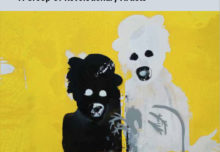By Chris Wells
Just across from Forest Hill station, at café From The Forest, they famously had a visit from Jay-Z and Beyoncé. In The Teapot, however – just up the hill, on the way to the Horniman Museum – the fare is distinctly more soulful: a couple of months back we ate red velvet cake with Tony Momrelle and, just the other week, sipped latte with Debra Debs.
Debra’s debut album, Lifecycles, received widespread praise at the turn of the year for its strength of songwriting and intriguing blend of neo-soul, jazz and West African flavours – Debra is originally from Cameroon – the set peaking at the top of our Sweet Rhythms Chart. It raises her up another level from a very fine four-track EP back in 2010, Whuman, out of which the track Africa jumped to global acclaim on the back of a video that ran up a million-and-a-half viewings on Youtube.
https://www.youtube.com/watch?v=NSSmIF62ODM
Debra shot the above back in the Cameroon capital Yaoundé, having flown over to perform some live shows and record TV appearances:
“My mum is friends with the Director of Programmes at the national TV station, so we got some interviews there and I did some live performances. He came down to see me at one of the shows and afterwards he asked me if we had a video that they could use on air after I’d gone.
“I contacted a friend I had who made videos and told him we had three days to shoot something, before I left. I gave him the concept – something grungy, that related to the message in the song – and we shot it in one day, in a market in Yaoundé. The video guy had a camera and I just stood there and sang. People were walking by, taxi drivers were beeping horns… unfortunately, the police stopped us going into the actual market.
“Then there was the bike scene. There were a lot of bikers around and I paid the guy we used about £5 for a 20-minute job. He’d normally make about 50p in half an hour, so he was up for it. I was scared of falling off the whole time. I think it cost about £700 all in.”
Debra has lived in England since 2000, when she came over, just ahead of her 18th birthday, to study Media and Film at a college in Winchester. It took her only about five months to figure out she’d made the wrong move.
“I called my mother and told her – ‘cause she had paid the fees, and it was a lot of money,” describes Debra. “I think it was about £6,000, plus accommodation. So that was £9,000 down the drain! What I really wanted to do was my music. So my mum flew all the way over from Cameroon to talk to me. She said, ‘Everyone else’s child is doing medicine or management or economics… and you want to do music?’ Because, back in Cameroon, music is looked on as something you might do if you didn’t have an education. Musicians are seen as… hippies!
“Here I could see it was different. So I saved up some money and paid off about a quarter of my deposit on my diploma and then my mum gave in and paid off the rest. She is very proud of me now.”
Indeed, it was from mum’s record collection that Debra got the bug in the first place – she’d grown up on Ella Fitzgerald and many of the grandest names in the pop and rock fields: The Beatles, Elton John, Dolly Parton and more from what she’d heard at home. While at boarding school in Cameroon, the teenage Debra joined the choir and soon thereafter helped to form a girl group, which, she says, toured the country and gained her valuable on-stage and co-writing experience. Back then she loved Boyz II Men. It wasn’t until she discovered neo-soul that she found out where she really fitted in.
“When I first heard Erykah Badu’s On & On, that was it for me. Then I heard D’Angelo’s music, then Lauryn Hill, Jaheim and Musiq Soulchild… suddenly I knew I had found my sound. It has jazz, R&B and gospel all in one. People like Jill Scott and Musiq were a reflection of where I was. I especially loved Musiq’s first album. I was amazed by Ledisi too.
“I remember, there used to be Sunday ‘jazz jam’ sessions at the Jazz Café, and I’d sing some Chet Baker and Ella Fitzgerald songs there – people seemed to like them. But I wasn’t really a straight ahead jazz singer and I don’t think I could ever be a great R&B singer either – it doesn’t suit my voice. The neo-soul sound, between jazz and soul, is definitely where I sit.”
Debra spent most of 2011 trying to complete Lifecycles, but ran out of time. She decided to take a break from music during 2012 and, the following year, took her mother’s sage advice and flew back for those gigs and TV dates in Yaoundé. She’s been taking off ever since.
“For people like me, from Cameroon, there is a need to infuse your music with your roots. I don’t want to sound like I’m American, or just another artist from that particular genre. I want to be different. I’m proud of where I come from.
“And Cameroon is only just coming up. We had Manu Dibango, of course, and more recently the jazz artist Richard Bona… but, y’know, they are not as appreciated in their own country as they are overseas. I noticed, when I took my soul sound to Cameroon, some people thought it wasn’t for them – they saw me as making music only for the wealthy, or something. And I thought music was for everybody. I’m going to prove to them it is.”
Buy Lifecycles here: https://itunes.apple.com/gb/album/lifecycles/id767767055
Or: http://www.cdbaby.com/m/cd/debradebs13


